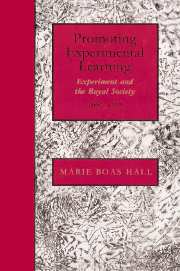Book contents
- Frontmatter
- Contents
- List of figures
- Preface
- A note on dates
- 1 Introductory
- 2 Aims and ideals
- 3 The record of the minutes 1660–1674
- 4 The communication of experiment 1660–1677
- 5 The record of the minutes 1674–1703
- 6 The communication of experiment 1677–1803
- 7 The record of the minutes 1703–1727
- 8 The communication of experiment 1703–1727
- 9 The view of the world; friend and foe
- Abbreviated titles
- Notes
- Bibliography
- Index
5 - The record of the minutes 1674–1703
Published online by Cambridge University Press: 03 December 2009
- Frontmatter
- Contents
- List of figures
- Preface
- A note on dates
- 1 Introductory
- 2 Aims and ideals
- 3 The record of the minutes 1660–1674
- 4 The communication of experiment 1660–1677
- 5 The record of the minutes 1674–1703
- 6 The communication of experiment 1677–1803
- 7 The record of the minutes 1703–1727
- 8 The communication of experiment 1703–1727
- 9 The view of the world; friend and foe
- Abbreviated titles
- Notes
- Bibliography
- Index
Summary
The problems faced by the Council when it met to determine future strategy in the autumn of 1674 have already been discussed (Chapter 2). To summarise, it was finally determined (7 October)
That such of the Fellows, as regard the welfare of the Society, should be desired to oblige themselves to entertain the Society, either per se or per alios, once a year at least, with a philosophical discourse grounded upon experiments made or to be made
with a forfeit of five pounds in case of failure, a heavy fine when a year's subscription amounted to only a shilling a week. In spite of the Council's firm resolution, nothing was placed upon the statutes, and the new proposals were minatory only, never binding. But, as will be seen, they worked fairly well for the next year or two and set the pattern for what became the most usual mode of ‘entertainment’ at meetings, that is, the reading of papers, while experiments performed at meetings became fewer.
The meetings in the autumn of 1674 began as intended. Wallis read ‘a discourse on gravity and gravitation grounded on experimental observations’; Boyle presented the Society with ‘Experimental Notes of the mechanical production of Fixedness … ’, which Oldenburg read for him (it was to be published the next year); Petty read his ‘Discourse concerning the Importance and Usefulness to Human Life of the Consideration of Duplicate and Subduplicate Proportion’ (a somewhat curious work, not really an experimental discourse); while, after the anniversary meeting, Hooke read ‘his discourse, concerning the construction and uses of his new quadrant’; Grew his ‘Discourse concerning the nature, causes and power of mixture’ on 10 December, when ‘several of the experiments mentioned in this discourse were exhibited after it was read’; and, a week later, Oldenburg read two ‘treatises’ by Ray on botany.
Information
- Type
- Chapter
- Information
- Promoting Experimental LearningExperiment and the Royal Society, 1660–1727, pp. 66 - 97Publisher: Cambridge University PressPrint publication year: 1991
